Workshop Overview
This workshops seeks to bring together seasoned and early-career technologists, practitioners, and scholar-activists to improve our sensemaking and strategizing about today’s crises. This workshop explores what Tamara Kneese has deemed the last decade’s shift from “techlash” to “tech fash” (Kneese, 2025). What have we learned from the era of misinformation and bias, of “surveillance capitalism” and tech worker organizing that can inform our struggle against the increasing power of a techno-fascist oligarchy? We will also look towards previous generations of computing professionals and activists, who likewise sought to address the harms of emerging automated systems and the complicity of computing within violent, imperialist projects. This workshop will create space for participants to explore these questions collectively, bridging past and present moments in an effort to devise strategies moving forward.
Our goals are to:
- build our capacity for collective organizing in computing
- explore workplace organizing as an importantq site for contributing to struggle and resistance
- expand our geneologies of computing activism
Tentative Workshop Agenda
8:30–9:30AM ET / 2:30–3:30PM CEST – Reflecting on the Tech Lash
- Brief, 2–3 minute presentations from organizers from #NoTechforICE, No Tech for Apartheid, union and worker organizers within tech-ademia
- Open Q&A and discussion
9:30–10:30AM ET / 3:30–4:30PM CEST – Radical Histories of Collective Organizing in Computing
- A conversation with Joan Greenbaum, Computer People for Peace and Lucy Suchman, co-founder of Computer Professionals for Social Responsibility
10:30–11:30AM ET / 4:30–5:30PM CEST – Small Group Discussion and Concluding Remarks
- Small group discussion, with parallel online and in-person discussions; focus on applying strategic reflections from panel discussions to strategies for collective action in computing in response to rising technofascism and austerity
- Report backs and concluding remarks
